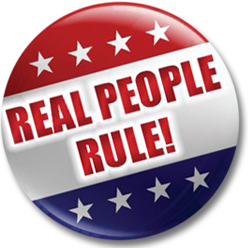Jim Allison, one of the founding members of Reverse Citizens United, has written a series of plays about the history of the Citizens United decision and related issues. He writes plays with the intention of introducing audiences to the absurdity of ‘corporate personhood’ and to expose the arbitrary nature of our system of judicial review. It’s an alternative way to help educate fellow citizens about historical events in the courts that affect our daily lives.
- Four Forensic Follies (A Corporate Quartet for the 99%)
- Download the script.
- Justice John Paul Stevens Dissents
- This monologue dramatizes Stevens’ dissent in Citizens United, plus some prefatory biography. His work is headed for stardom among the great Court dissents, and gives an authoritative answer to those who want to know where the majority went wrong. Many of the words in the monologue are his, but I have tried to minimize the legalese in favor of the vernacular.
Lois Sabo-Skelton has performed this monologue in several different venues. A film of one of her performances has been available on YouTube. The same film is in the permanent collection of CATS in the Monroe County Public Library, Bloomington, Indiana.
Download the script, or watch a November 2013 performance in Bloomington, IN archived on Youtube: Part 1 (30 min, 12 sec), Part 2 (26 min, 46 sec).
- Morality Play
- This brief skit is used to introduce an audience to the absurdity of ‘corporate personhood.’ This particular foible first came to Jim’s attention in the writings of David Korten, and says he has yet to see a refutation. Download the script.
- The Prosecution of Judge Waite, adapted from a play by James Allison
- This is surely Jim’s best known play and he says “my purpose in writing the play was to dramatize the fraudulent character of a Supreme Court decision frequently cited as the legal precedent for corporate personhood.” An elaborate studio production by a group in Oregon, can be seen on YouTube. There have been staged performances and table readings across the country. One of the best, starring Gladys DeVane and Bill Breeden, and directed by Steve Krahnke, was filmed in Bloomington, Indiana. The film is in the permanent collection of CATS in the Monroe County Public Library, and has often been broadcast on local access TV.
- Mr. Powell Writes a Memo
- The progressive reforms of the 1960s and 1970s, highlighted by Medicare, the Voting Rights Act, and the establishment of the Environmental Protection Agency, were soon followed by a strong conservative counter-attack, still in progress, that has threatened even the signature reforms of the New Deal. Many trace the design of this counter-attack to an obscure memo written in 1971 by Lewis Powell, then an attorney, but soon nominated by President Nixon to fill a vacancy on the Supreme Court of the United States. This play is about Powell, his memo, and his use of the Court to implement its designs. Google can take you straight to the original Powell memo.
- What Corporations Do
- Corporate apologists often excuse their exclusive focus on the bottom line as a legal obligation forced upon them by a Michigan Supreme Court decision in a case called Dodge v. Ford (1919). In actual fact, this is another fraudulent precedent, much like the corporate personhood precedent in The Prosecution of Judge Waite. In this particular case the decision included a passing remark to the effect that a corporation’s primary concern was shareholder profit. But with or without that remark, the Court would have ruled as it did: Henry Ford owed the Dodge brothers, the shareholders who sued him, another $19 million or so because he had given them such a tiny dividend in a year of gargantuan profit for Ford Motor Company. The decision was based on fairness, not on a corporation’s primary concern as opined in a casual courtroom remark. This play exposes the fraud in a classroom setting whose students include Henry Ford, Adam Smith, James Madison, and Milton Friedman.
- Marshall Law
- Many Americans know that the Supreme Court of the United States has the power to nullify laws passed by Congress and signed by the president. The power is absolute, beyond appeal, reversible only by the Court itself or by constitutional amendment. What they probably do not know is that this power is nowhere to be found in the Constitution. It is a power the Court took for itself in Marbury v. Madison (1803), in a decision written by Chief Justice John Marshall. It is not part of the Constitution. It is the Marshall Court’s view of the judiciary’s proper role in relation to the other two branches, the executive and the legislative. Lawyers call it our system of judicial review.
This play exposes the arbitrary nature of our system of judicial review. Other democracies have a very different system, one that provides the legislative checks and balances on the judiciary branch that our system lacks and very much needs.
